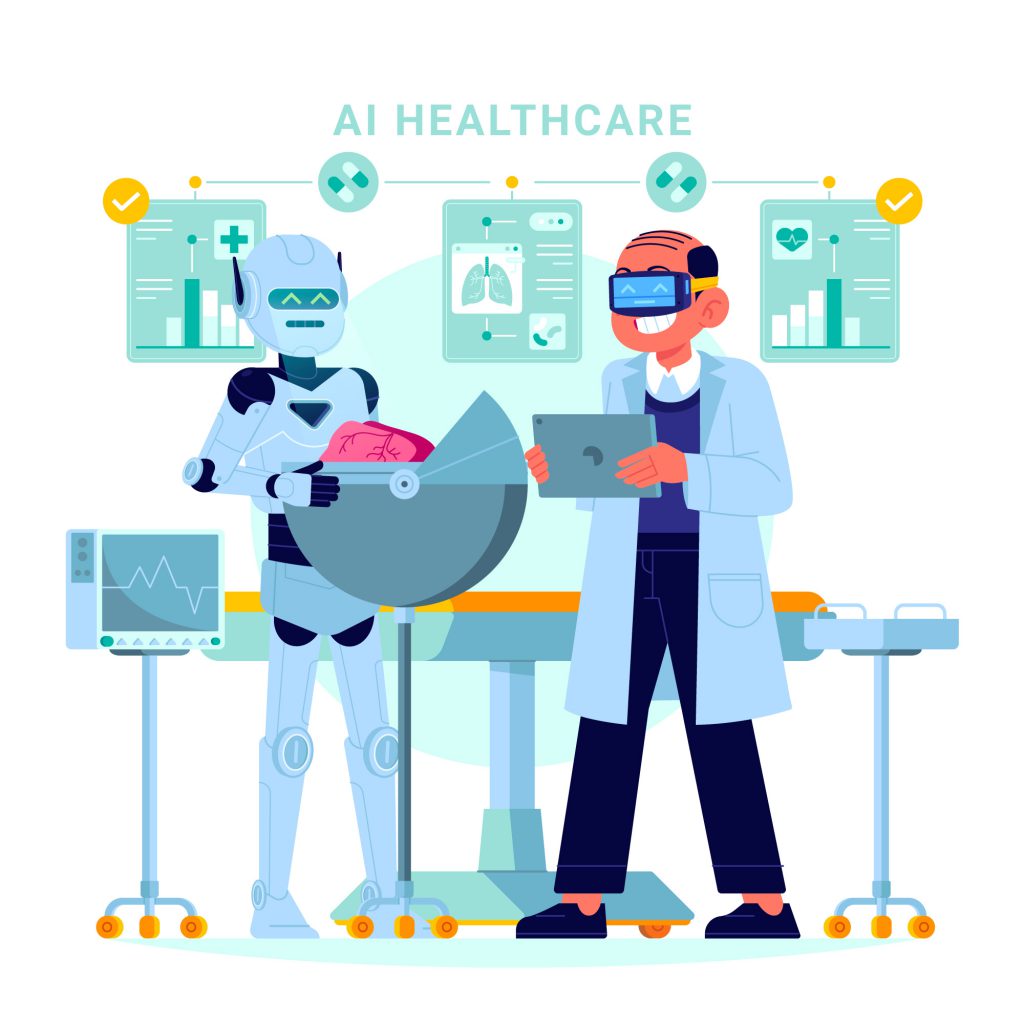Forget complicated tests and endless paperwork – imagine healthcare powered by a super-smart helper! That's what Artificial Intelligence (AI) is doing: changing how doctors diagnose, treat, and care for patients. Think of it as a digital sidekick, crunching numbers and spotting patterns humans might miss, all to improve your health. Curious how? Let's explore the top 7 ways of transforming AI in healthcare, one step at a time!

1. Increase Diagnostic Correctness:
One of the biggest advantages of AI in Healthcare is increased diagnostic correctness. With incredible precision, machine learning algorithms can analyze medical images, such as X-rays, MRIs, and CT scans. AI systems can quickly identify patterns and anomalies that may go unnoticed by the human eye, leading to earlier and more accurate diagnoses. This capability is particularly determining in conditions like cancer, where early detection can significantly improve treatment success rates.
2. Predictive Analytics for Preventive Care:
AI allows healthcare providers to leverage predictive analytics for protective care. By analyzing patient data, including medical history, lifestyle factors, and genetic information, AI algorithms can identify individuals at risk for certain diseases. This proactive approach allows healthcare professionals to intervene early, providing personalized preventive measures and lifestyle recommendations. Ultimately, this can lead to a reduction in the prevalence of chronic diseases and a more cost-effective healthcare system.
3. Streamlining Administrative Processes:
The healthcare industry is elegant for its complex and often time-consuming administrative processes. AI solutions can automate various administrative tasks, including appointment scheduling, billing, and coding. By reducing the administrative burden on healthcare professionals, AI not only increases efficiency but also allows them to focus more on patient care. This streamlined approach can lead to improved patient satisfaction and overall operational effectiveness within healthcare institutions. So, Streamlining administrative processes is best for AI in healthcare.
4. Drug Discovery and Development:
AI in healthcare is accelerating the drug discovery and development process, a traditionally lengthy and resource-intensive endeavor. Machine learning algorithms can analyze vast datasets to identify potential drug candidates, predict their efficacy, and optimize formulations. This not only expedites the drug development timeline but also reduces costs associated with failed experiments. AI-driven drug discovery has the potential to bring new and more effective treatments to market faster, addressing unmet medical needs and improving patient outcomes.
5. Personalized Treatment Plans:
The era of one-size-fits-all medicine is gradually giving way to personalized treatment plans, thanks to AI for Healthcare. By analyzing individual patient data, including genetic information, lifestyle factors, and treatment response, AI algorithms can recommend personalized treatment strategies. This tailored approach takes into account the unique characteristics of each patient, maximizing the effectiveness of interventions while minimizing adverse effects. Personalized medicine has the potential to revolutionize patient care, particularly in areas such as oncology and chronic disease management.
6. Remote Patient Monitoring:
AI is playing a crucial role in enabling remote patient monitoring, especially in the era of telehealth. Wearable devices equipped with AI algorithms can continuously monitor vital signs, detect early warning signs of deterioration, and alert healthcare providers in real time. This not only improves the management of chronic conditions but also allows for more timely interventions, reducing hospitalizations and healthcare costs. Remote patient monitoring using AI enhances the accessibility of healthcare services, especially for individuals in remote or underserved areas.
7. Robotic Surgery and Assistance:
AI in healthcare is transforming surgical practices through the integration of robotic systems. Robotic surgery, guided by AI algorithms, allows for more precise and minimally invasive procedures. Surgeons can benefit from enhanced visualization, improved dexterity, and real-time feedback, leading to better surgical outcomes. Additionally, AI-powered robotic systems can assist surgeons by automating certain tasks during surgery, further reducing the risk of human error. As this technology continues to advance, the potential for safer and more efficient surgical interventions becomes increasingly apparent.
Conclusion:
The integration of AI in healthcare is ushering in a new era of possibilities, with transformative benefits that span diagnostic accuracy, preventive care, administrative efficiency, drug discovery, personalized medicine, remote patient monitoring, and surgical practices. AI in healthcare is at the forefront of these advancements, playing a pivotal role in shaping the future of medical practices. While challenges such as data privacy and ethical considerations must be addressed, the potential for AI to positively impact the healthcare landscape is undeniable. As technology continues to advance, the collaboration between AI and healthcare professionals, along with ongoing developments in AI-driven healthcare solutions, holds the promise of improving patient outcomes, reducing costs, and ultimately, revolutionizing the way we approach healthcare. For more insightful articles on the intersection of technology and healthcare, visit techtalkstoday.

